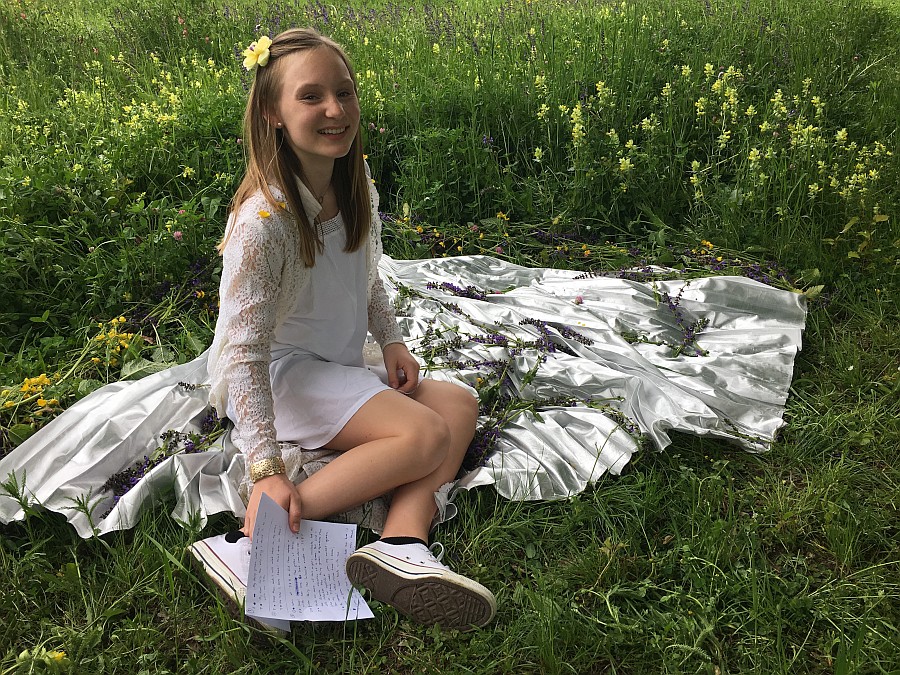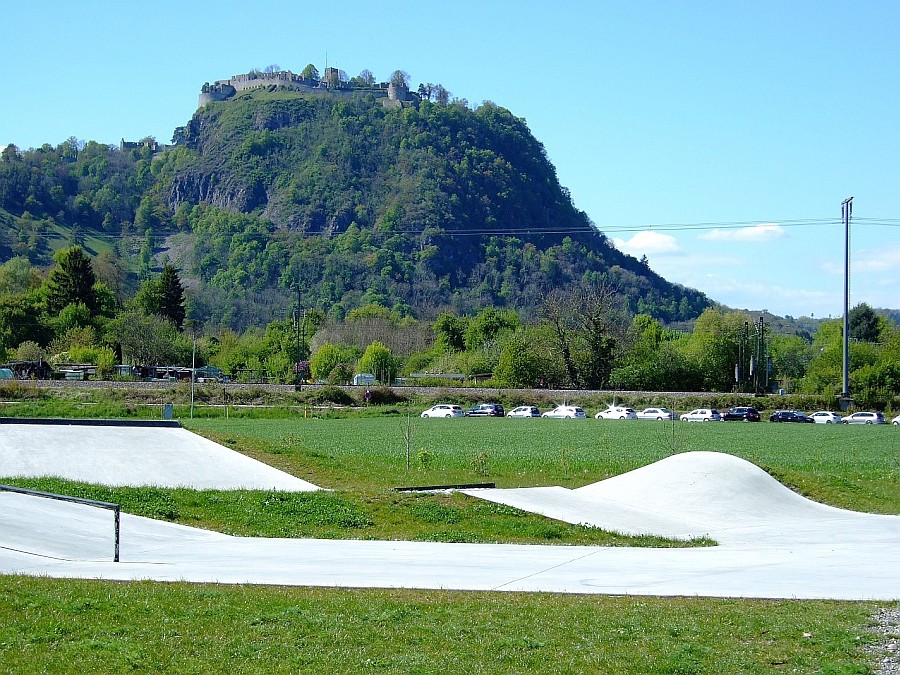
The first CultureShake learning activity took place at the Friedrich-Wöhler Gymnasium at Singen from 08/05/2017 to 12/05/2017.
Aim
The aim of this learning activity is to collectively process, apply and assess the products created thus far as part of the project. The products in question are relevant to two of Shakespeare’s works; A Midsummer Night’s Dream and The Tempest. This learning activity focuses on Shakespeare’s A Midsummer Night’s Dream.
Project objectives within the learning activity
- promoting language competence
- promoting multilingualism
- developing the European dimension in education through focusing on multilingualism
- granting access for intercultural concepts on transcultural learning
- supporting mobility for teachers and learners
Content concept
Learners who have a background as refugees take part in this project and should not be made the exception or be a specialty, even if for e.g. their asylum-seeking contract forbids them to travel. Seeing as our concept is not set on cultural diversity and does not seek to generate intercultural exercises. Moreover, it works on the foundation of cultural and lingual hybridisation, consequently strengthening transcultural practises. For that reason the products of this project only highlight differences where necessary. When it is possible these points will also refer to the individual culture of the people.
Preparations: The activities of this week were already planned ahead along with the project partners in coherence with contract initiation. Since the official start of the project on 01/09/2016 the conceptualisation was further specified, assessed and enhanced.
Participants
Pupils of the Stifelsen English School of Gothenburg (ESG) in Sweden and the Friedrich-Wöhler Gymnasium (FWG). The pupils of ESG were lead by their teachers Chloe Bye, Clare Skoglund. Organisation of FWG was managed by Yannick Kuch, Dr. Simone Paulun, Anna Räuber and Hildi Rieger. The learning activities were academically supported by Dr. Annette Deschner (University of Education, Karlsruhe), Dr. Mojca Kompara (Primorska University Koper in Slovenia) and Lisa Peter (tutor at the Shakespeare Birthplace Trust Stratford, UK).
The following activities took place during the week.
Monday, 8 May 2017
The learners already knew each other through activities on eTwinning and had exchanged mails and messages. In the project they should work together in transnational school teams. The teams explored the school building at the beginning of their stay. The principle of the school, Sabine Beck, welcomed the guests from Europe in the staffroom, where the teaching body and guests engaged in conversation.
The first workshop followed the topic of language biography (see products: Intellectual Output 4). At the beginning of the project the learners created a language matrix to be used here. In this matrix the learners gave specifics on their mother tongue and acquired foreign languages. The language biography, as a meditative exercise for enhancing language awareness, brought out languages that couldn’t be detected in the matrix before because the learners had not listed them. Hazaragi, a dialect from Persia, appeared as a mother tongue in the drawing of a pupil’s heart. The pupil had not listed her mother tongue before as it is not an official language. The learners from Afghanistan and Syria with a background as refugees approached the task with hesitation. In the aftermath of the exercise it became apparent that these learners were not used to talking about their native languages.
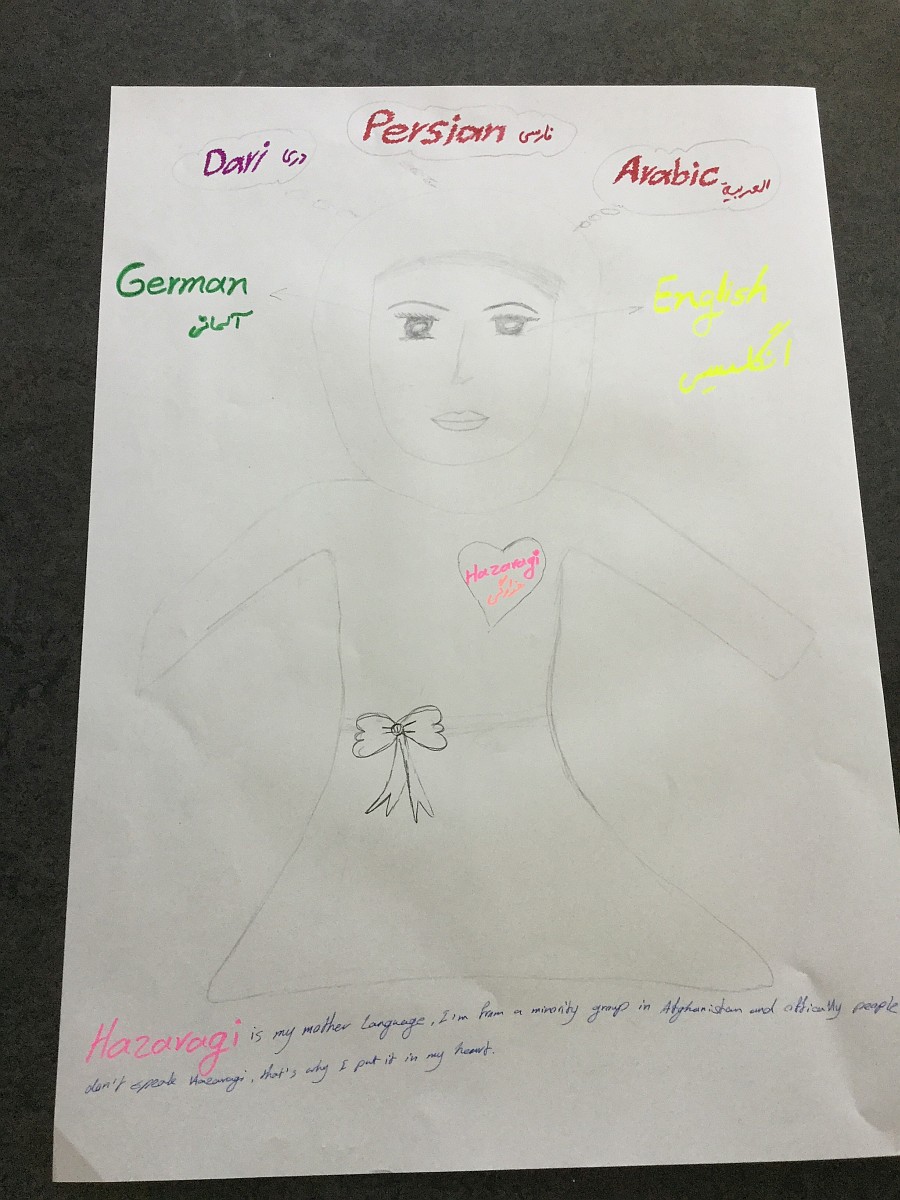
Afterwards the learners with a background as refugees vocalised a very positive attitude towards the exercise, because they were able to view “themselves” as normal in this context. They did not view the exercise as one made specifically for refugees, and themselves having a special position in it, but rather as one organic part of the community of the project (learning community). This is also the fundamental goal of CultureShake: to convey the normality in cultural hybridisation and to create materials and visions for a coexistence that reaches beyond CultureShake into everyday school life. Showing that a fusion of languages and cultures can be normal. As an example; Persian, on the one hand, is the mother tongue of a child refugee, and on the other hand it is the mother tongue of a completely “normal” pupil of the ESG in Sweden. The language biographies uncovered many different varieties in languages that belonged to the pupils of the FWG. For the refugee children it brought them closer to normality whereas the local children gained more internationality. The FWG librarian, Mrs. Barnhardt, helped in the successful execution of this exercise as she took care of the posters for the language biographies and welcomed us in the rooms of the library – creating a warm and welcoming workspace with a fantastic view of the Hohentwiel.
Following this first cumulative working experience in a workshop atmosphere, a scientific introduction on Shakespeare was given. As the learners were already contextually prepared, they could take part in the interactive presentation by commenting and asking questions. The presentation had the goal of giving an introduction to the life and work of Shakespeare and bridge the gap to the peer teaching and video workshops that would follow. A central aspect was the deconstruction of the widely spread view of Shakespeare as an exclusively high culture field and therefore belonging to a more elitist cultural transmission.
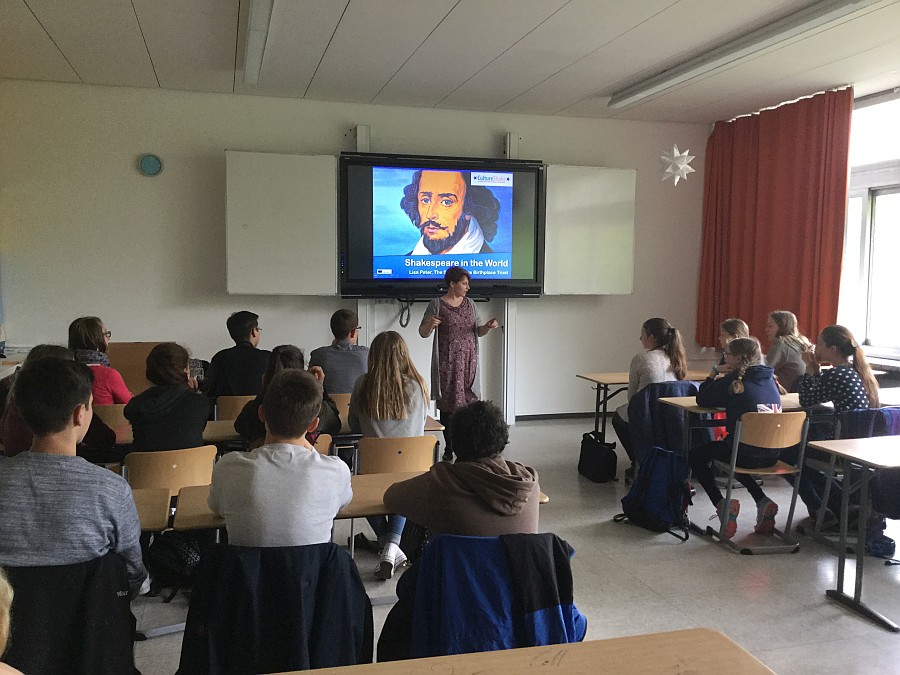
In the presentation, steps were taken to create a new view of Shakespeare with the learners. The theatre life during Shakespeare’s time was introduced through the geographical layout of the city of London. The Puritans had banned theatres – with the Globe among them – to the outer districts. Shakespeare had to make a living off of his work among pubs and brothels. With the reconstruction of the concept of Shakespeare, from an elite and untouchable idol to a working author facing the struggles of everyday life, the transnational learner teams were prepared for upcoming tasks during the week. An elaboration on the different translations of Shakespeare’s works (for e.g. Klingon) formed a link to the language biographies of the previous workshop.
By looking at the covers of various different translations, the learners had to guess which language and play was represented. This proved to be a fairly easy task for the linguistically diverse pupils. In the course of this task an amusing incident occurred; upon asking the learners which play and language the Persian title represented, they promptly answer “Arab”. When the teacher asked them why they thought they simply replied, “because it says so”.
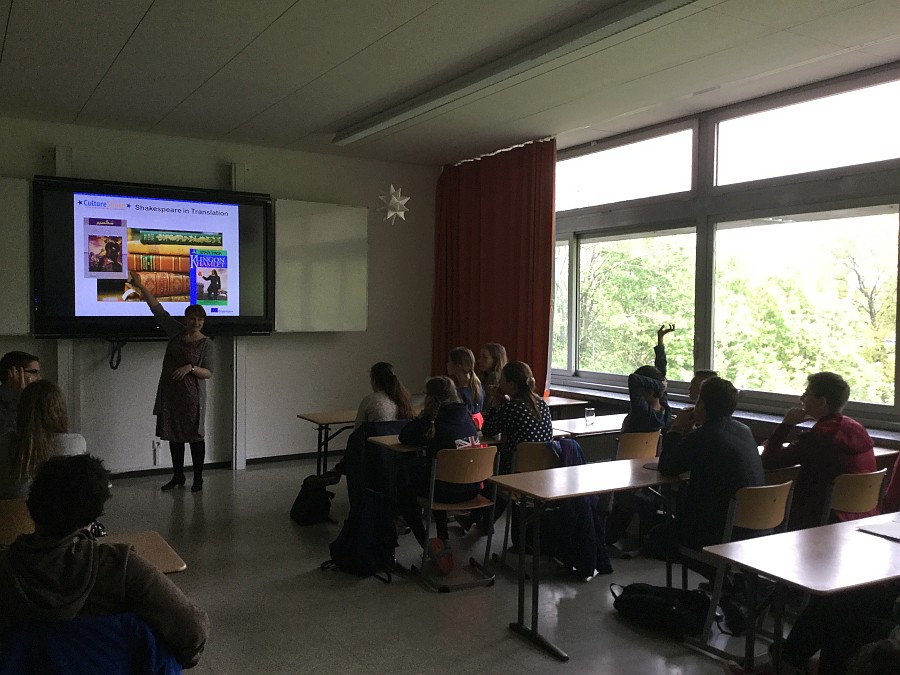
During lunch breaks we enjoyed the kitchen and fresh salad bar of the school’s cafeteria under the generous management of the family Ulbrich and the attendants Mrs Münzer and Mrs König. Due to the pleasant atmosphere, our lunch breaks quickly became an excellent opportunity for communication with the members of the teaching body. Our exchange with the world class teacher Mrs Brandi-Dohrn and the vice-principle Mr Spitzhüttl provided valuable insight for the project.
The pupils spent their afternoon of this first day at their host families. Here they were able to get to know their team partners and their surroundings better so as to acclimatise to Singen after the tiring trip. The project team held an additional transnational project meeting (M1a) on this afternoon.
Tuesday, 9 May 2017
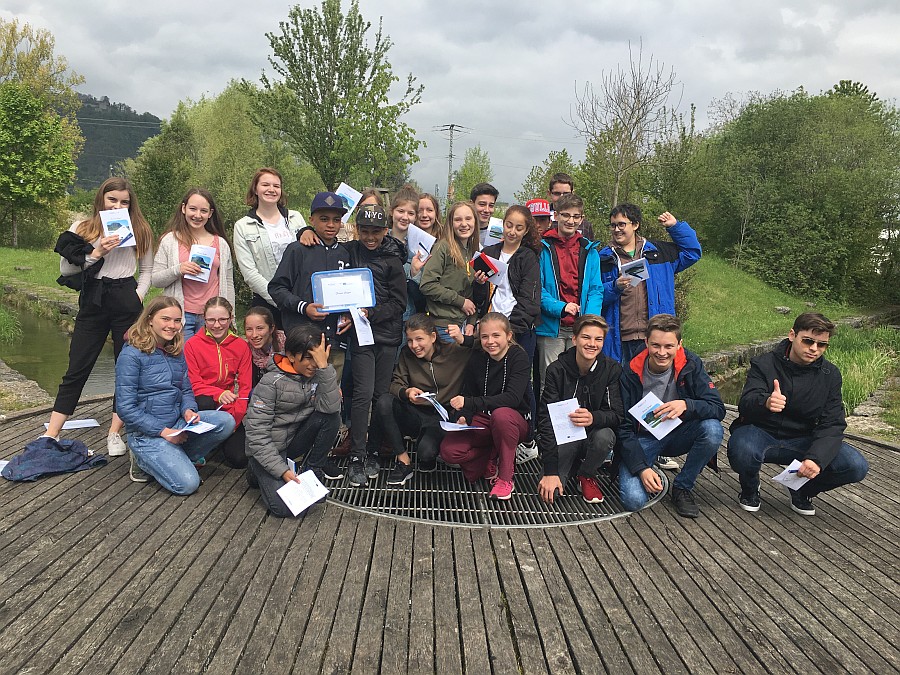
How can visitors, beyond the regular city tour, experience the lively city of Singen? By using the Geocache “Fairies Singen” (compare Products IO 4) the learners could explore the sights of Singen, which was important to the pupils of the FWG. These places were collected beforehand and conceptualised in form of a Geocache, with which both host and visitors could get to know Singen. For the “treasure” Titania’s fairies Peaseblossom, Cobweb, Moth, Mustardseed and Puck found the elven song from Shakespeare’s A Midsummer Night’s Dream. This Geocache can be used in the future for other exchange groups from Australia, France and Italy.
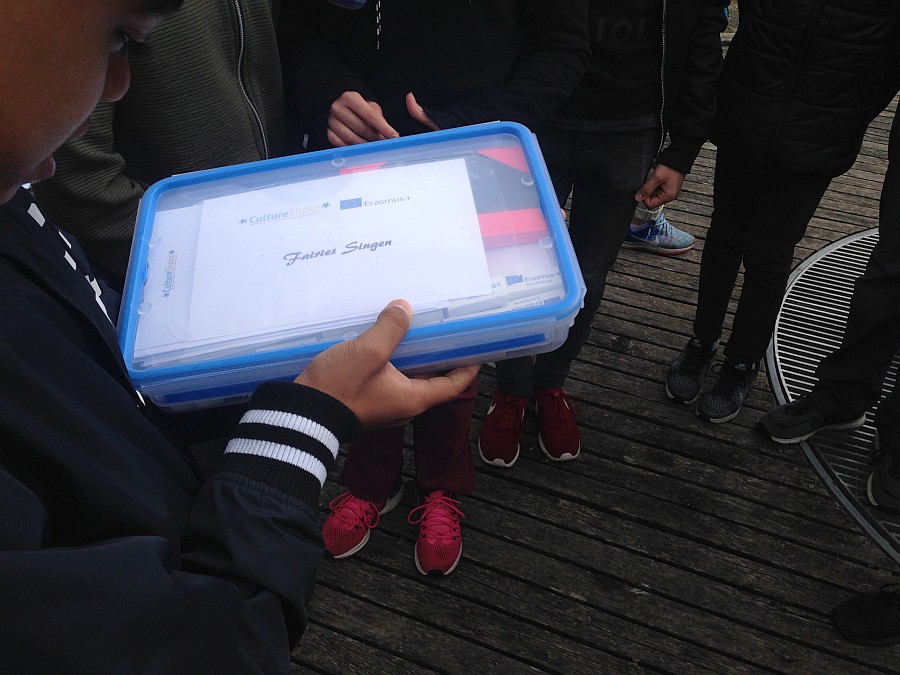
Up until now the project partners created workshops and activities for the learners, for the rest of this day the transnational learner teams were able to take over. Together they should come up with and work on questions for peer teaching materials. This workshop was introduced as a way to reiterate the concept of inclusion and multilingualism as a means to literacy in terms of the priorities of the project. This acts as the foundation for peer teaching material (more under Intellectual Output 3).
The day that begun with “Fairies Singen” ended in the evening at an orchestral rehearsal of the Rielasingen e.V. with Mendelssohn-Bartholdy’s A Midsummer Night’s Dream. Pupils of CultureShake, who are members of the orchestra, had invited our group to the rehearsal.
Wednesday, 10 May 2017
We were received by mayor Seyfried in the hall of Singen’s city council. She welcomed the European project CultureShake in the four-land-region in front of the mural “Krieg und Frieden”, which was made by Otto Dix for the city council in Singen in 1960. A representative of the local regional newspaper “Südkurier” was also present.
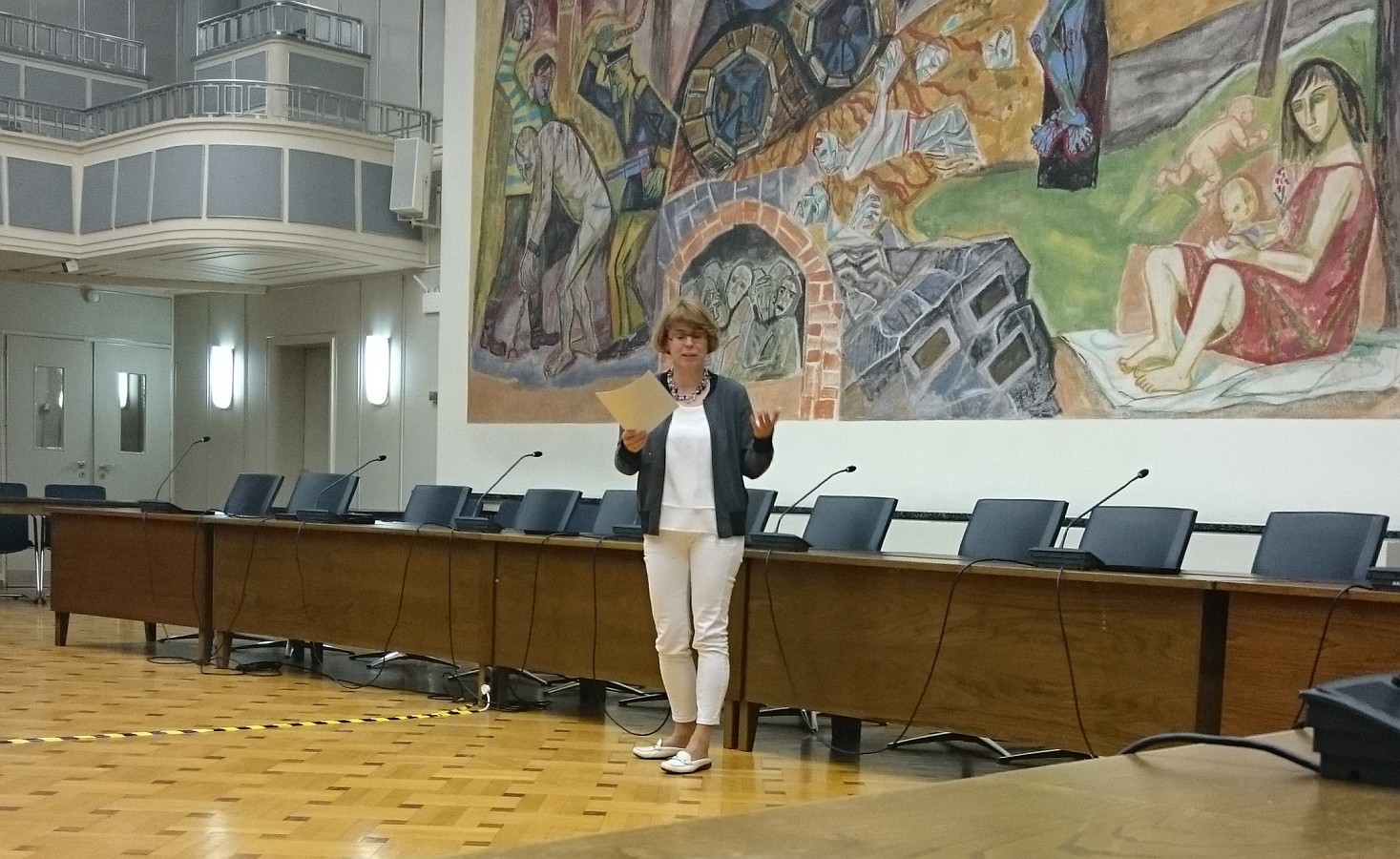
After having recognised and experienced varieties of languages and inner multilingualism within the transnational teams, a “local culture” exercise was started. Inspired by Mark Wagler’s idea of thinking outside of culture containers (Terry Eagleton), the thematic orientation of the gathering was not to think of a “Swedish” or “German” culture and language, but rather to work on a subject in language diversity. In the local culture exercise the learners were not familiarised with national symbols like flags, monuments or public holidays, moreover the exercise concerns the individual culture of a person and their environment. For that reason, the learners came up with and drew symbols for their own culture. This revealed that symbols from for e.g. sports, music and family could transcend boundaries as they are found in Germany, Sweden, Afghanistan or Syria (more under Intellectual Output 4).
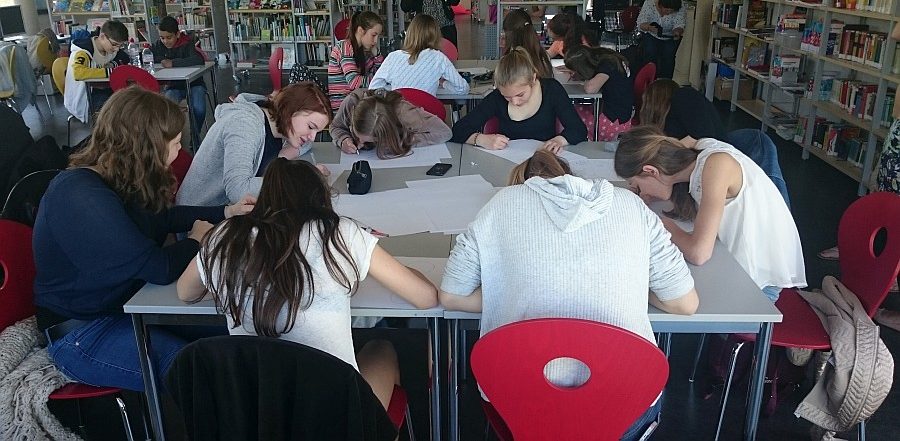
The subsequent workshop “CUSHA Online Dictionary” targeted digital and linguistic competences. Using and working with a dictionary makes sense through the combined supplemental activities on multilingualism, transcultural dynamics and Shakespeare. It is not about learning to use a dictionary to look up terms, but about creating an individual dictionary on the subject of the project. With the online platform Termania the transnational teams were able to make their own Shakespeare dictionary. The first collective workshop focussed on entries from A Midsummer Night’s Dream. During the course of the project the dictionary will be expanded with entries from Shakespeare’s The Tempest. Pictograms and audio files will also be added, because not all child refugees had the opportunity to go to school. This goes to show that pupils can still learn together in an inclusive concept. This way, other speakers can create the entries and the content can be understood without needing alphabetic skills and so linguistic competence can be fostered. The teams worked with a shortened version of the original. Shakespearean English was new to all the learners and had to be developed together. For the online dictionary the learners chose their own words that they wanted to enter. Then they found speakers of the other languages, as the word should be translated for all the other project participants. This opened the language bazaar; “I need someone with Swedish. Where is a person who speaks Persian? Who can help me with…?” This exercise supports the concept build up (cf. Cummins and Butzkamm) on a cognitive level by reflecting the foreign concepts with concepts of the mother tongue (more under Intellectual Output 2).
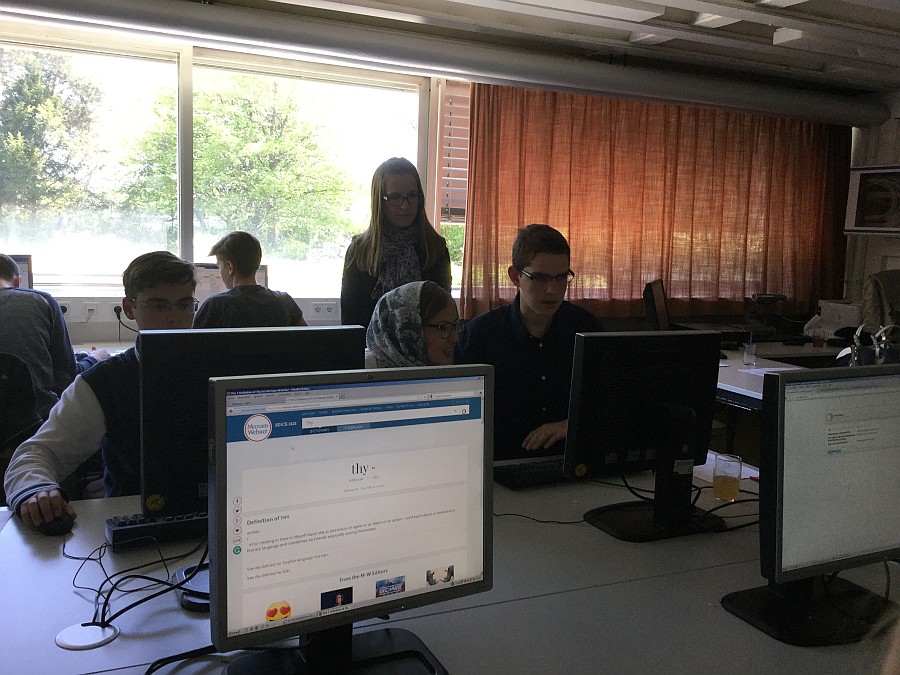
This evening’s movie night was organised by a group of pupils. The selected film was Michael Hoffman’s A Midsummer Night’s Dream. Pupils of the FWG introduced the feature and the evening came to a close after conversations on the film.
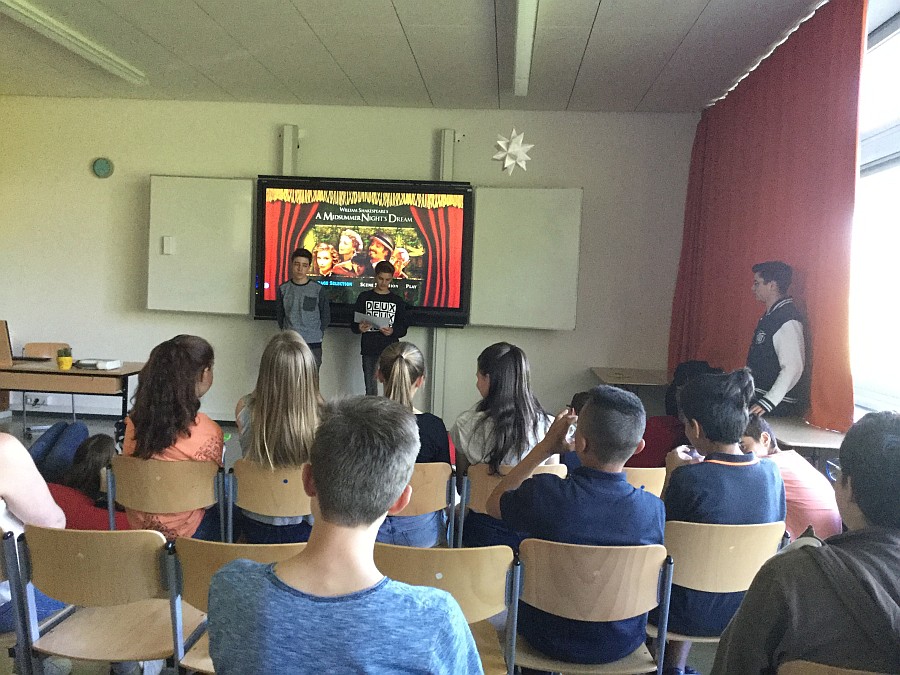
Thursday, 11 May 2017
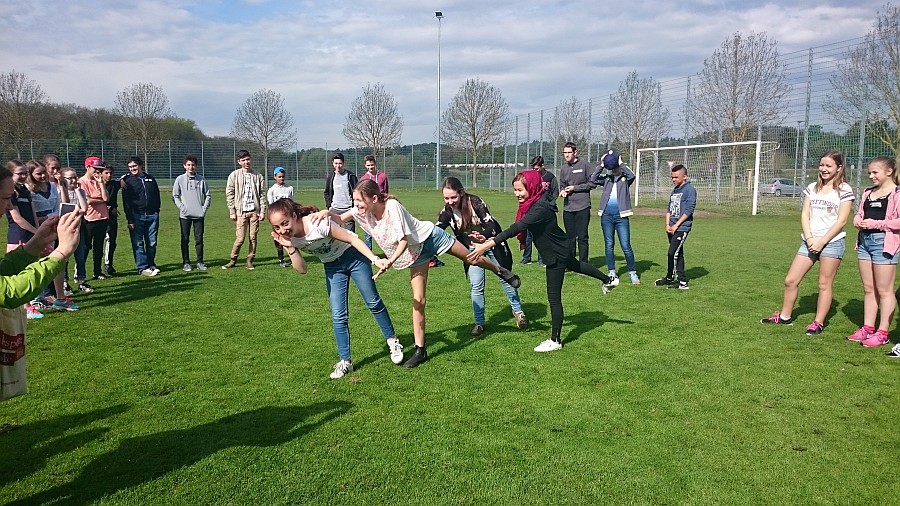
The entire day was assigned to videos and acting. After a warm-up activity outside, scenes were prepared for video recording in the afternoon (more under Intellectual Output3). The experts supported the transnational learner teams in their preparations with single or group discussions.
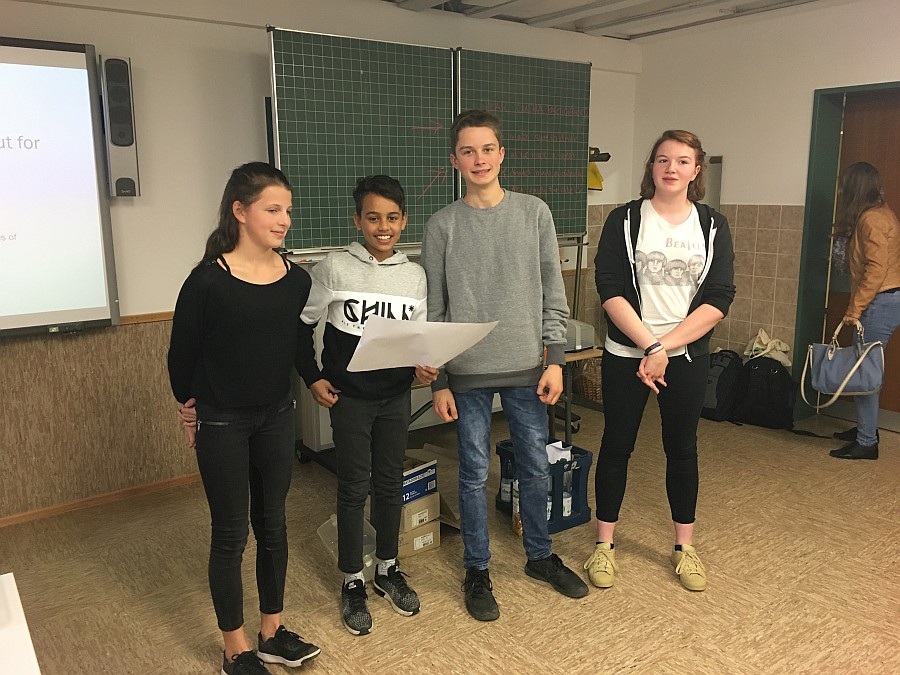
In the afternoon the teams searched for a suitable filming location in the vicinity of the FWG. The island of Wehrd, the Münchried – forest and the view of the Hohentwiel were chosen for their diverse possibilities. To the group, the different teams reported on their video recordings and exchanged their findings. The videos were edited afterwards by pupils of the ESG (more under Intellectual Output 3).
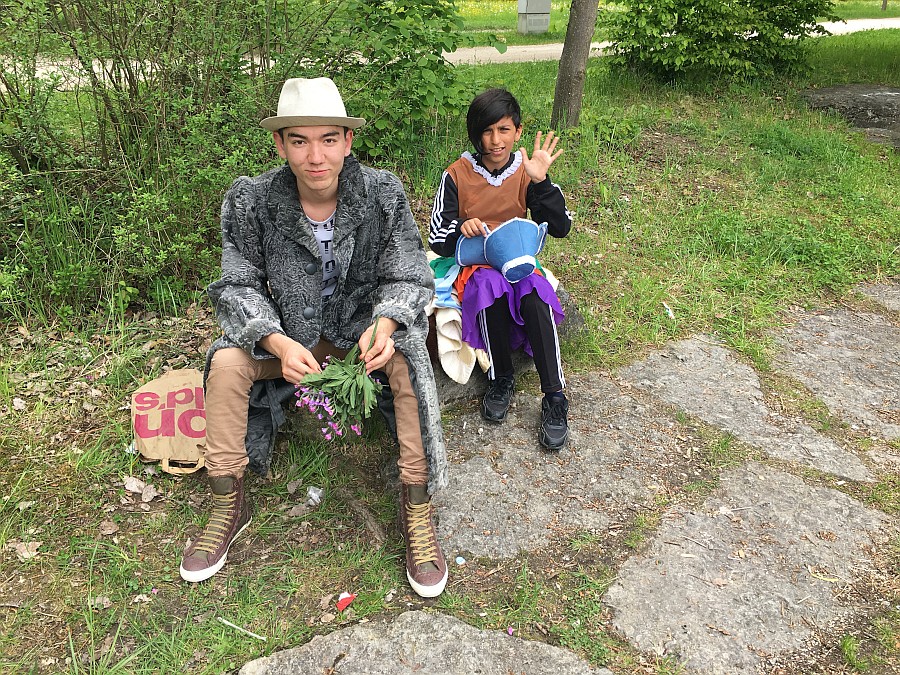
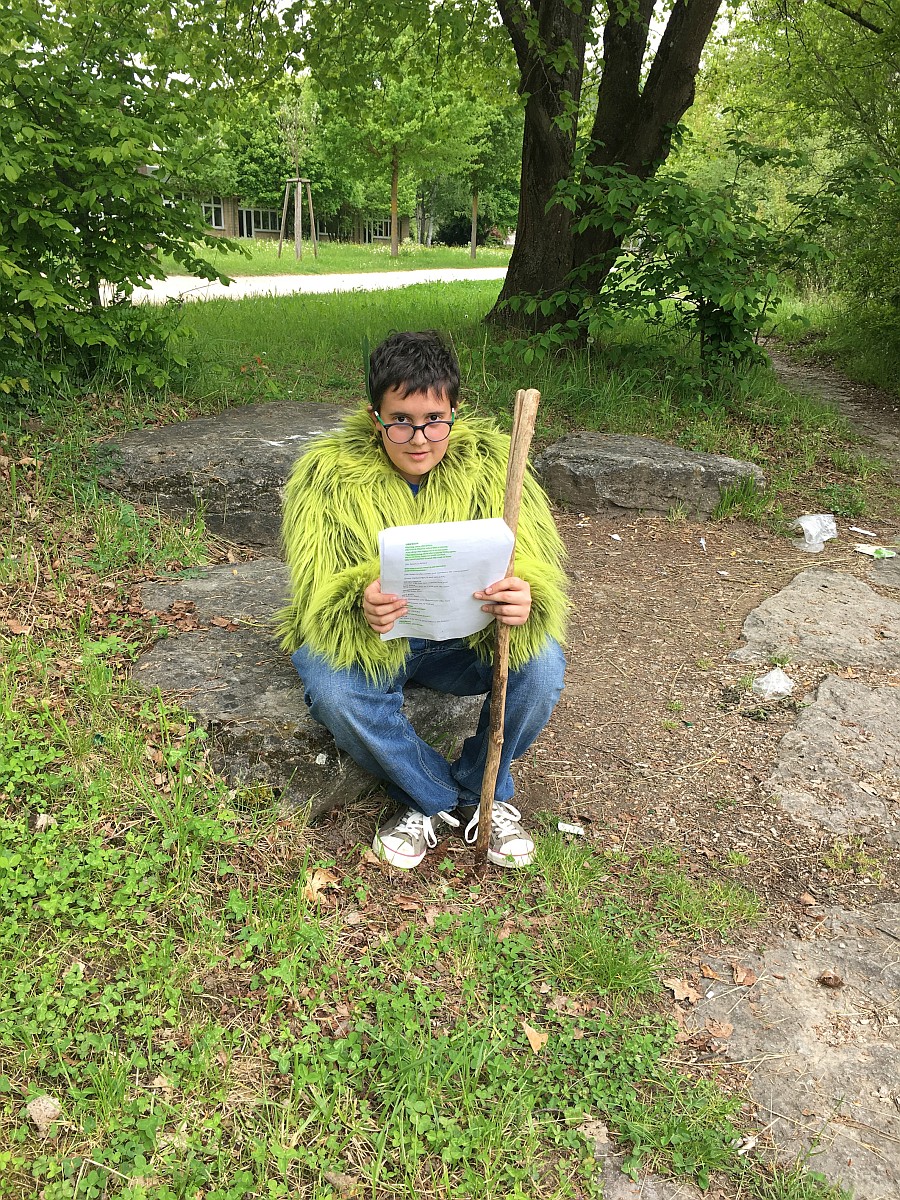
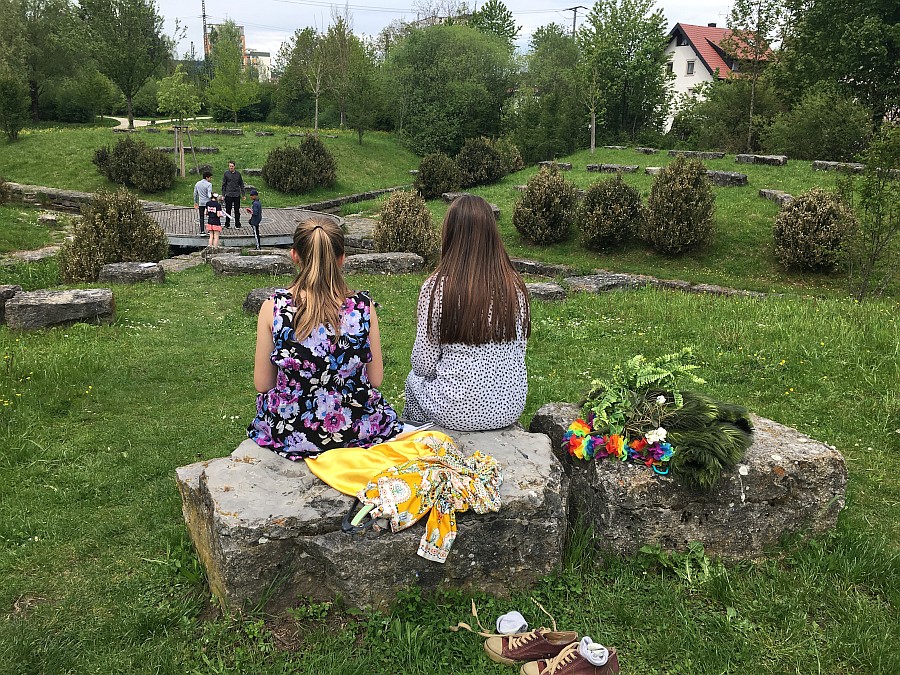
The evening was left to the host families to conduct individual arrangements.
Friday, 12 July 2017
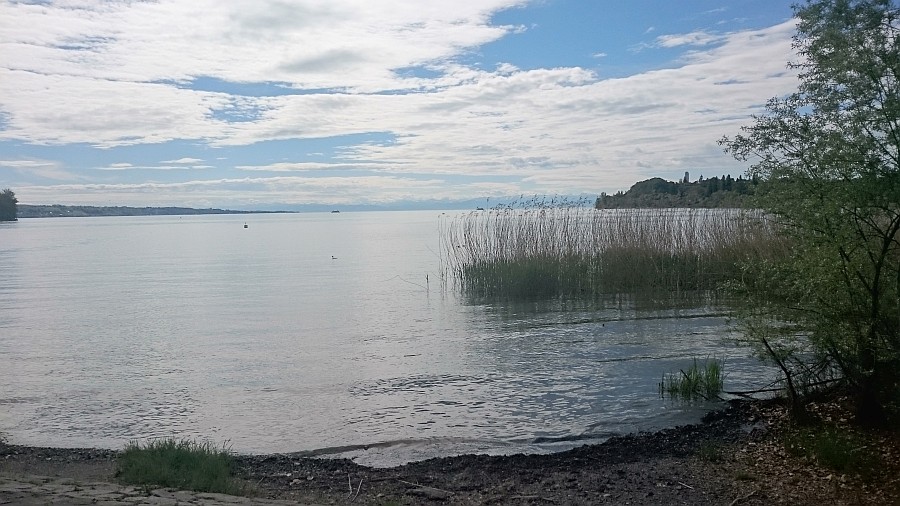
For those in the know, the Mainau is not only a flower paradise but also seen as “Shakespeare – Island”. There are annual performances by the American Drama Group Europe. At the reception of Lady Bernadotte, Sweden was present at the Bodensee through its connection with the royal family, and a little Swedish was spoken.
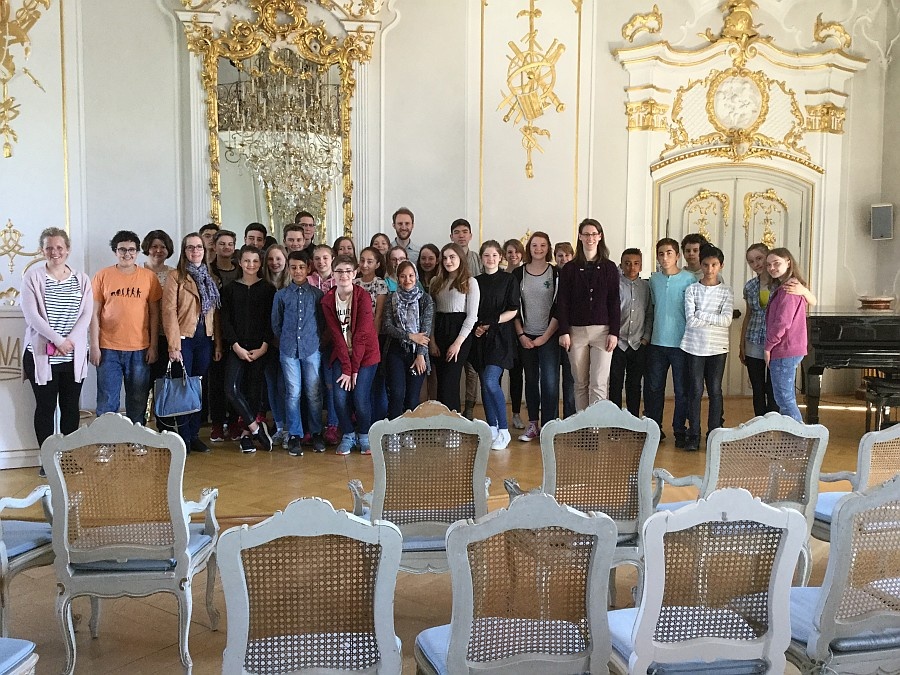
After exploring the island we took the ferry over to Constance. The Alp-panorama of the Bodensee followed us.
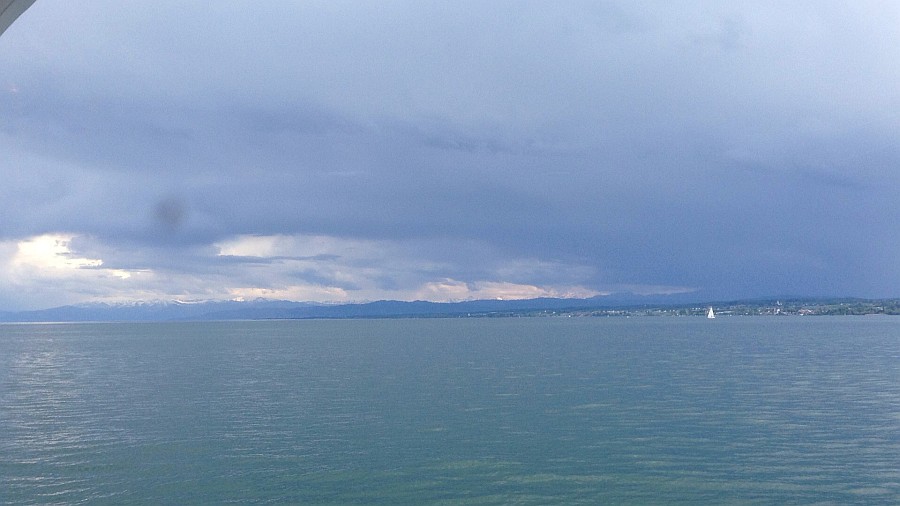
Not only during the “walk around town” in Constance did we put the CultureShake bags to good use.
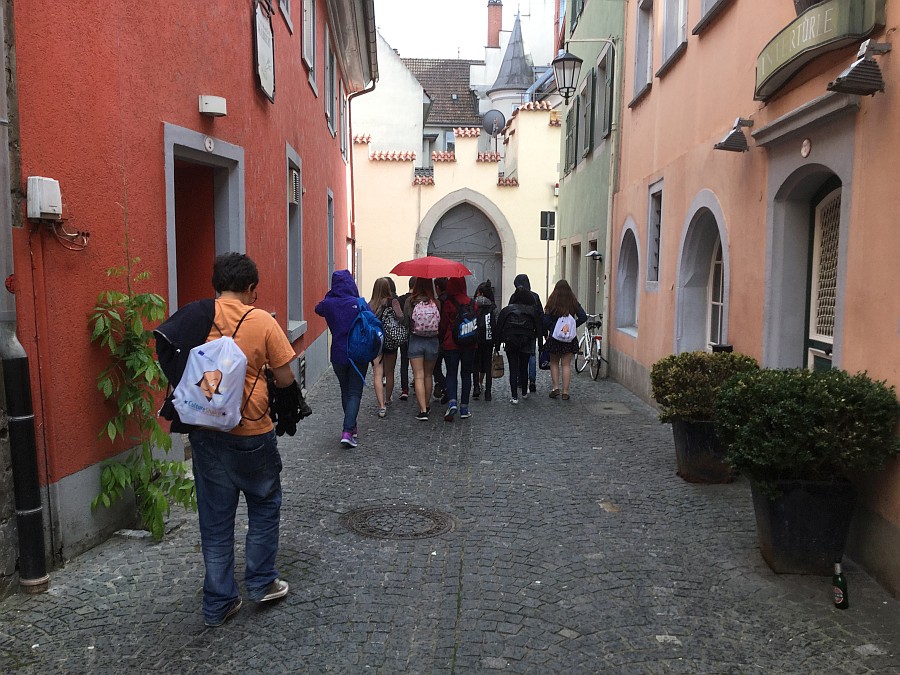
After exploring the island we took the ferry over to Constance. The Alp-panorama of the Bodensee followed us. Not only during the “walk around town” in Constance did we put the CultureShake bags to good use. We celebrated the concluding of an intense week in a guesthouse at the Bodensee. The scenery darkened as a summer storm broke out over the lake. One pupil made a very fitting remark, “this is the perfect scenario for Shakespeare’s The Tempest”. – an appropriate transition for our next journey, which takes us to Stratford …
